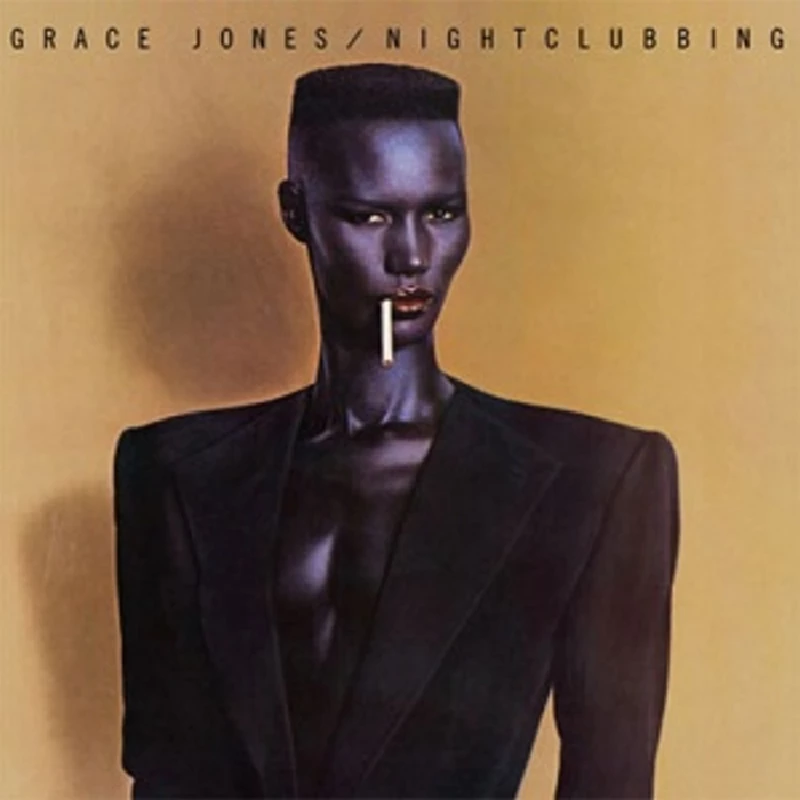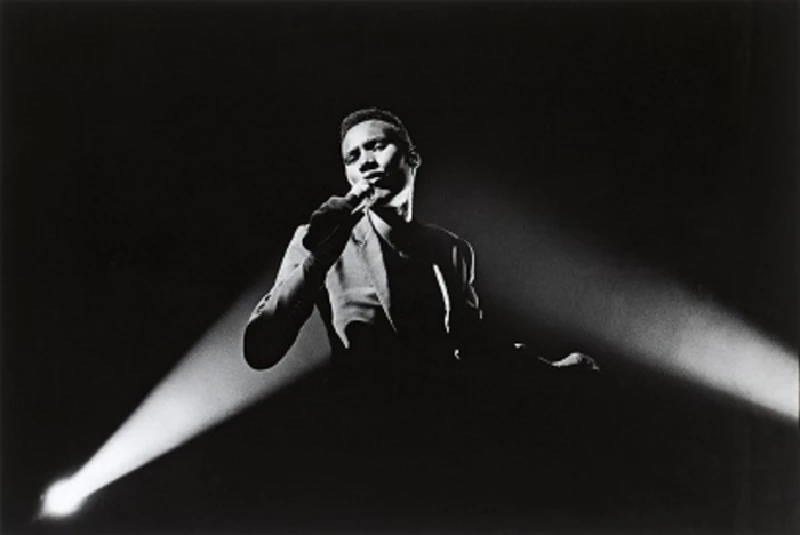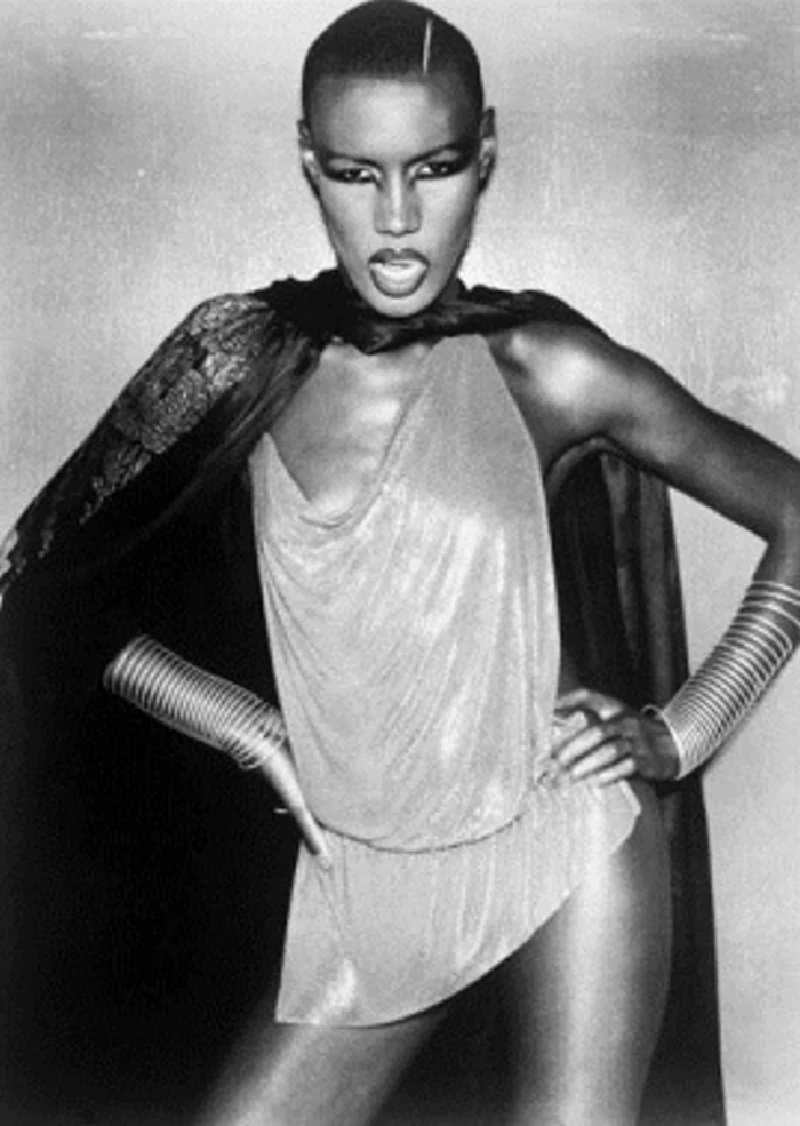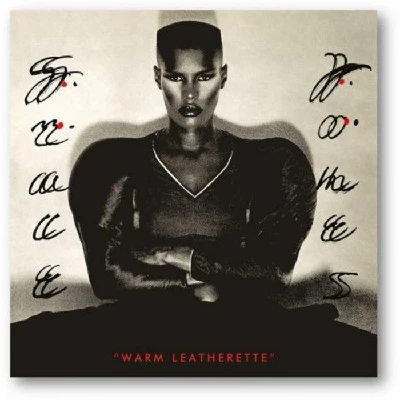Grace Jones - Nightclubbing
by Adrian Janes
published: 6 / 6 / 2014

Label:
Select Label
Format: N/A
intro
In our 'Re: View' section, in which our writers look back at albums from the past, Adrian Janes reflects on Grce Jones's 1981 album 'Nightclubbbing', which has just been re-released in a double CD edition
'Nightclubbing’ is the second in the trilogy of albums Grace Jones recorded at Compass Point in the Bahamas which were released between 1980 and 1982 (the others are ‘Warm Leatherette’ and ‘Living My Life’). Apart from her own striking voice and image, what links them just as importantly is the outstanding playing of the Compass Point All-Stars, a studio band put together by Island Records boss Chris Blackwell. Upon the foundation of Robbie Shakespeare (bass) and Sly Dunbar (drums) are laid Wally Badarou’s keyboards, the guitars of Mikey Chung and Barry Reynolds, and percussion by Uziah ‘Sticky’ Thompson, creating a unique mixture of reggae, funk, soul and rock. As a former model (and future film star), Jones is especially image-conscious. The album’s iconic cover, with its riot of gender signals (cropped hair and lipstick, mannish jacket on a slight frame), serves as an alert before the music even begins. And when it does, with ‘Walking in the Rain’, the ambiguities are only reinforced, as her low-pitched voice declares she’s “feeling like a woman/Looking like a man”. It’s interesting to compare this song of self-conscious alienation with the previous decade’s ‘Walking in the Rain (With the One I Love)’ by Love Unlimited, the latter traditionally feminine and cloyingly romantic in character, whereas Jones - here at least - seems on her own in every sense, her walk leading to no rendezvous, romantic or otherwise. Underpinning her affectless vocals, Dunbar’s reggae drumming entwines with Shakespeare’s fluid, funky bassline. Deftly-struck guitar and a muted, melancholy synth disclose her mixed emotions, the loneliness of the defiantly self-reliant. The mood then shifts into the celebration of ‘Pull Up to the Bumper’, its sex and car lyric slick with lubriciousness. Shakespeare’s bass is funky poetry, he and Dunbar easily slipping into a disco rhythm on the bridge before returning to the dominant driving rhythm, while keyboards, guitar and percussion skilfully weave in and out: throughout the album there is this real sense of a band of mutually sympathetic musicians, assertive enough for their talent to be heard, but never at the expense of the song’s overall effect. Over a spare steppers rhythm, ‘Use Me’ is stark; dark synth notes and the occasional electronic drum smash stand out. Here Jones almost seems to take on a ‘Women Who Love Too Much’ role, welcoming emotional exploitation (“Keep on using me/Until you use me up”), with a climax of Badarou’s agitated keyboard and the soul-style repetition of the title, like a supplicating choir. But it should be remembered that this is originally a Bill Withers song, so if Jones is giving the song her own twist, it’s a further turn of the screw from Withers’ subversion of the image of the emotionally contained male. Starker still is the title track, Jones’ echoing voice evoking an all but deserted club. Stripped down and considerably slower than the Iggy Pop/David Bowie original, her tone is tired, a thrill-seeker who has seen all that was once hidden and is now jaded and sarcastic: “Oh, isn’t it wild?” Spooky keyboards, strangled guitar notes and scratchy percussion are all dropped into the abyss in which Jones wanders. The icy, atomised atmosphere so acutely rendered is somewhat ironic in view of the fact that she was actually a devotee of such then-fashionable hang-outs as Studio 54, seeing in them something of the joyful spirit of the church of her youth. More than for most singers, her renditions are performances. ‘Art Groupie’ is slow pop reggae which, while it may further evoke something of the world in which she moved (not least because her then-partner, designer Jean-Paul Goude, had been instrumental in fashioning her image), is rather slight in comparison to much of the album. Indeed, it’s the first of three songs - along with ‘I’ve Seen That Face Before (Libertango)’ and ‘Feel Up’ - which are passable rather than impressive. The former, despite its sinister undercurrent of possibly being followed by a stalker (“A hawk seeking for the prey”) and fairly sprightly rhythm, has a certain blandness to the music, the prominence of Jack Emblow’s accordion and a spoken word interlude in French making for the most obvious of Gallic clichés. ‘Feel Up’ has an African air with its prominent percussion and Badarou’s bright keyboard, but there is a sense that, having got into the groove, Jones and her band can’t see where to take it, leaving a tantalising feeling of being on the verge of a song that never arrives. ‘Demolition Man’, written by Sting for Jones (although the Police later recorded it as well), is one of the album’s most dynamic tracks. Founded upon Dunbar’s walloped drums and Shakespeare’s bass snarl, the band are at their peak, like a group of top chefs each adding spice (such as the dashes of discordant guitar) to a musical gumbo. The somewhat silly lyrics are salvaged by the music’s strength and Jones at her most steely. “It’s love you need, but I don’t play that game,” she sneers, and you believe her. But this belief lasts only for the length of the song, as on closer ‘I’ve Done It Again’ she just as convincingly conveys regret in a Joni Mitchell-like register, the music of a wistful synth and caressed guitar forming the perfect complement. Being a deluxe reissue, a second CD comes with the original album. This mainly consists of 12” single and extended versions of the tracks on the first CD. But apart from the fairly enjoyable ‘Peanut Butter’ (an instrumental version of ‘Pull Up to the Bumper’ with dub touches, rather than a full-blown dubwise excursion), these tend chiefly to establish the good judgement of producers Chris Blackwell and Alex Sadkin displayed in the generally terser versions that made the final cut. Similarly, two songs recorded during the same sessions, ‘If You Wanna Be My Lover’ and Gary Numan’s ‘Me! I Disconnect from You’ are tolerable but give no reason to think that they should have displaced anything from the 1981 album. ‘Nightclubbing’ certainly merits its reissue, not just because of some outstanding songs and performances, but because they and their singer are a fascinatingly individual slant on the era, an intersection of disco, early electronica and the replacement of roots reggae by dancehall, with Jones a kind of New Romantic Eartha Kitt. If at times Blackwell and Sadkin’s production feels a little too sumptuous, they mainly achieve an atmosphere distinct and suitable to each song, from the frigidity of ‘Nightclubbing’ to the sunshine of ‘Feel Up’.
Track Listing:-
Also In ReView
Al Kooper and Mike Bloomfield (2019)
Andreas Dorau (2022)
Andrew Gold (2023)
Anthony Moore (2022)
Bark Psychosis (2018)
Beatles (2023)
Bert Jansch (2020)
Bert Jansch (2019)
Beth Orton (2014)
Big Eyes Family (2021)
Billy Idol (2018)
Bitter Springs (2021)
Blind Mr Jones (2015)
Blondie (2022)
Blue Nile (2014)
Bodines (2023)
Boyracer (2023)
Breathless (2016)
Brinsley Schwarz (2017)
Cardiacs (2014)
Chesterfields (2025)
Chvrches (2014)
David Bowie (2022)
David Gray (2020)
Death and Vanilla (2016)
Donald Fagen (2021)
Doug Dillard Expedition (2024)
Earthworks (2020)
Flamin Groovies (2015)
Flaming Stars (2024)
George Harrison (2024)
Giant Sand (2020)
Giant Sand (2018)
Gomez (2018)
Gong (2015)
Grace Jones (2016)
Graham Day and the Forefathers (2019)
Hawks (2021)
Hawkwind (2022)
Hot Pepper (2018)
Ian A. Anderson (2021)
Ian Dury (2021)
Iron Butterfly (2014)
Jesse Garon and The Desperadoes (2025)
John Cooper Clarke (2016)
Joni Mitchell (2021)
Keith Richards (2022)
Lapre (2020)
Lemonheads (2022)
Loft (2025)
Loft (2021)
Madness (2014)
Madonna (2024)
McCarthy (2015)
Mercury Rev (2019)
Miscellaneous (2020)
Miscellaneous (2014)
Monochrome Set (2015)
Mothmen (2015)
Motorpsycho (2015)
New Leaf (2022)
New Musik (2023)
One Thousand Violins (2023)
Orchestral Manoeuvres in the Dark (2015)
Orchids (2023)
Party Day (2021)
Pele (2017)
Phil Alvin (2015)
Phil Ochs (2016)
Primitives (2015)
Prolapse (2022)
Roger Mcguinn (2018)
Rubik (2021)
Saloon (2025)
Sorrow (2018)
T. Rex (2023)
Television Personalities (2018)
Terry Allen (2016)
Thin Lizzy (2023)
Townes Van Zandt (2015)
Trashmen (2020)
Ty Segall (2022)
UB40 (2015)
Various (2022)
Various (2022)
VIPS (2020)
Wolfhounds (2015)
Zz Top (2018)
Band Links:-
https://en.wikipedia.org/wiki/Grace_Joneshttps://www.facebook.com/GraceJonesOfficial/
https://twitter.com/miss_gracejones
Picture Gallery:-


Visitor Comments:- |
| 705 Posted By: Tom Watson, Syndney, Australia on 26 Jun 2014 |
|
This rerelease has also been released on High Fidelity Pure Audio BluRay. While I applaud the release and fidelity of the release, A huge miss for the publisher not to release a surround version of this seminal release in this new format. Record companies still promise mush but quite often fail to deliver
|
favourite album |
|
Warm Leatherette (2016) |

|
| Following reissues of 'Nightclubbing' in 2014 and 2015's 'Disco' Grace Jones has even more to offer with the deluxe editions of her 1980 album 'Warm Leatherette' released on Universal |
photography |
|
Photoscapes 1 (2023) |

|
| In the first of two galleries, Andrew Twambley takes photographs of Grace Jones in a rare live performance at this year's Bluedot Festival.. |
| Photoscapes 2 (2023) |
most viewed articles
current edition
Shrag - Huw Stephens Session 08.12.10 and Marc Riley Session 21.03.12Gary Numan - Berserker
Razorlight - Photoscapes
John Hassall - Photoscapes
Max Bianco and the BlueHearts - Troubadour, London, 29/3/2025
Primal Scream - Photoscapes
Roberta Flack - 1937 - 2025
Waeve - Club Academy, Manchester, 18/3/2025
previous editions
Heavenly - P.U.N.K. Girl EPManic Street Preachers - (Gig of a Lifetime) Millennium Stadium, Cardiff, December 1999
Boomtown Rats - Ten Songs That Made Me Love....
Beautiful South - Ten Songs That Made Me Love...
Barrie Barlow - Interview
Oasis - Oasis, Earl's Court, London, 1995
Trudie Myerscough-Harris - Interview
Dwina Gibb - Interview
Pixies - Ten Songs That Made Me Love...
Doris Brendel - Interview
most viewed reviews
Pennyblackmusic Regular Contributors
Adrian Janes
Amanda J. Window
Andrew Twambley
Anthony Dhanendran
Benjamin Howarth
Cila Warncke
Daniel Cressey
Darren Aston
Dastardly
Dave Goodwin
Denzil Watson
Dominic B. Simpson
Eoghan Lyng
Fiona Hutchings
Harry Sherriff
Helen Tipping
Jamie Rowland
John Clarkson
Julie Cruickshank
Kimberly Bright
Lisa Torem
Maarten Schiethart